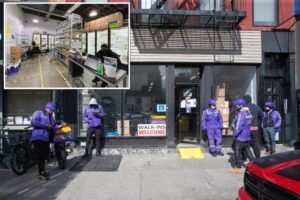Grocery delivery apps seek to satisfy angry neighbors and New York City councilors by transforming their barebones and potentially illegal delivery hubs into high-tech retail outlets open to the public.
As the legion of apps – including Gopuff, Getir, Gorillas and Jokr – have been launched in the five boroughs over the past year, they have slurped space for dark shops formerly occupied by delicatessens and shops, transforming the spaces to “dark” shops “that house groceries and are closed to the public.
Some local politicians have accused apps of violating zoning laws by driving department stores out of areas zoned for retail, while local residents have complained about constant electric bike traffic, as well as workers strolling and smoking outside delivery centers at all times of the day.
“Fast grocery delivery companies have come to realize that a dark store was nothing more than the modern version of a camper,” Brittain Ladd, a retail consultant working with fast delivery companies, told The Post. “They had the ugly coating over the window, people could not go inside if they did not work there. It attracted people who wanted to hang out, and there were a number of complaints about the noise and traffic. ”
In some cases, The Post observed the floors in delivery nodes filled with debris. In others, delivery workers were seen riding on e-bikes and scooters at lightning-fast speeds on city sidewalks. Even the cleanest and most well-organized hubs seem to have fluorescent lighting and worn decor.


But now, in an apparent attempt to satisfy both zoning laws and annoyed neighbors, many of the delivery apps, including Getir, Gopuff and Gorillas, have begun opening their stores to walk-in customers.
Getir’s delivery hubs throughout the city added “Walk-ins welcome” signs to their storefronts in March. Gorilla hubs also removed movies from their windows, adding “in-store pickup!” signs to their stores in March, as first reported by The Post. GoPuff told The Post that its stores have always welcomed walk-in customers, but some of its stores had not announced “walk-in” hours until recently. Jokr did not respond to a request for comment on whether it accepts walk-ins or plans to add them.
Critics disprove that startups’ pickup signs in stores are nothing more than an attempt to pull the wool over the eyes of concerned city councilors like Gale Brewer and Christopher Marte, who have both called on city agencies to investigate whether apps are infringing. zonelove.

That idea is supported by the fact that Getir, Gorillas, and GoPuff apps do not seem to allow users to choose in-store pickup, instead of only offering delivery.
“While customers can currently go in and place pick-up orders in the store, we recognize that the process is not as streamlined as we would like it to be,” Getir founder Nazim Salur told The Post. “We are always working to improve our store operations, including improving the in-store experience. We expect these changes to be implemented in the near future.”
“We are here for the long term and look forward to working with city officials and community leaders as we create great jobs throughout New York City and deliver a time-saving service that New Yorkers have already begun to embrace,” Salur added.
Gorillas declined to comment. Jokr did not respond to requests for comment.
Many of the stores, which are open to the public, also override city rules that require stores to accept cash and include clearly labeled prices on all items, among other rules, according to Councilman Brewer.
“You have to have labels on the grains,” Brewer told The Post. “It’s the law.”


Ladd, the retail consultant, said delivery apps should work to make their stores “as inviting as possible” in an attempt to both appease the city council and to satisfy neighbors, who may then begin to see the stores as neighborhood businesses rather than gloomy wounds in the eye. .
“What I told Getir, and what I told Gorillas, is that you need to change the perception of fast food delivery from being something mysterious to being something inviting,” Ladd said.
But Ladd added that many of the startups have been reluctant to shut outsiders into their stores because they “mistakenly thought they had to keep what they did in those stores secret.”
“I’ve told them all: none of you have a competitive advantage in this,” he said. “You all do the same thing.”
Fridge No More and Buyk, two other fast delivery startups that folded in March, as reported exclusively by The Post, did not have signs welcoming customers into their stores.
